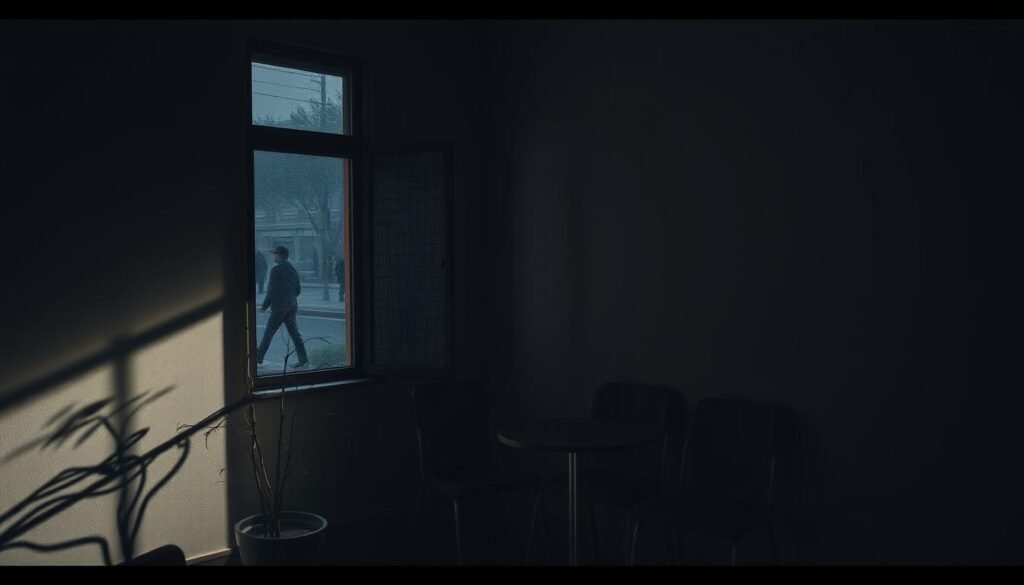Nearly 1 in 5 adults in the US face mental illness each year. Many deal with deep depression and dislike towards others. This highlights a huge challenge for millions—finding healing while feeling depressed and hating everyone. It’s a maze of emotions that can baffle even the most caring people. This shows how crucial mental health awareness is in recognizing and dealing with these feelings.
Those in this battle should know they’re not alone. Depression appears in many forms, unique to each person. Knowing this is key to taking back control. Everyone’s healing journey is different and deeply personal. It often involves facing hard feelings of bitterness and solitude, huge hurdles that block emotional growth and connection.
To start healing, it’s important to look into these feelings, understand where they come from, and use ways to get better. The path may be hard, but with proper support and tools, it’s possible to find your way from darkness to light.
Key Takeaways
- Nearly 1 in 5 adults face mental health challenges, emphasizing the widespread impact of depression.
- Understanding the personal manifestations of depression is crucial for effective emotional healing.
- Depression can lead to feelings of hostility towards others, often rooted in personal experiences.
- Individuals can confront their negative feelings through constructive coping mechanisms.
- Recognizing the uniqueness of each person’s depression is vital for support and understanding.
- Empathy for oneself can sometimes be more difficult than for others, complicating feelings of resentment.
Understanding Depression and Its Impact on Relationships
Depression changes how people connect with others. It makes some feel worthless, making it hard to build friendships. Often, those with depression see themselves as burdens. This belief damages communication and increases loneliness.
Depression affects how people see their relationships. They might feel like they’re falling out of love. They believe they’re trapped in unhappy situations. This situation can lead to blame and frustration at themselves and their partners. When things get this tough, it’s important to seek professional help to improve communication.
Depression can also make people lose interest in things they once enjoyed. They may look for excitement in new relationships or risky activities. Sadly, this can lead to substance abuse as they try to escape their feelings. Many end up feeling empty and disconnected from their partners.
To handle these challenges, it’s important to learn about depression’s effects. Reading resources like this helpful article can offer important insights. Families can begin to heal by supporting each other and talking openly. This helps everyone understand and address depression’s impact together.
Common Symptoms of Depression
Depression affects people deeply with a variety of symptoms. It shows up as constant sadness and losing interest in fun activities. People may also notice big changes in how much they eat, leading to weight gain or loss.
Other signs include sleep problems and feeling very tired most of the time. Getting irritable and finding it hard to focus are common too. For a doctor to say it’s depression, you need to feel five or more symptoms for two weeks. This is according to the Diagnostic and Statistical Manual of Mental Disorders, 5th edition, text revision (DSM-5-TR).
Some folks feel really down on themselves or guilty. They might think about hurting themselves. Depression can also make you hurt in places for no reason, feel more irritable, and very alone. People often pull back from friends, making them feel even lonelier.
Realizing these signs is the first step to getting better. Doing exercises, like yoga or swimming, helps improve mood. For more details, visit this source.
The Connection Between Depression and Hating Everyone
People with depression often fight many negative emotions. These feelings lead to disliking everyone around. They feel deeply sad, alone, and frustrated. This cycle of negativity makes them feel more isolated. Their depression makes them pull away from others, thinking no one gets their pain.
Negative Emotions and Isolation
Depression makes someone feel misunderstood and alone. Around 78% of those suffering feel like they’re not understood. This can make them shy away from friends and family. They’re scared of rejection and think they’re a burden. Being around others becomes hard, deepening their sense of isolation.
Their negative emotions make speaking to people hard. This makes keeping friends or making new ones challenging.
How Self-Loathing Contributes to Hatred
Self-hate can make someone dislike others too. A person deep in depression may blame people around for their feelings. This makes them hate everyone more. They think others cause their bad feelings. Cognitive-behavioral therapy (CBT) helps by dealing with these thoughts. It helps people see how their depression affects relationships. For more help, there are articles that offer advice on these tough emotions.
Understanding how depression leads to hating others is the first step to breaking this cycle. Accepting depression’s role in life helps start healing. It opens the door to better relationships with oneself and others.
Why Does Depression Lead to Social Isolation?
Depression can lead to feeling alienated and very tired. People with depression often feel like others don’t understand them. This feeling makes them pull away and feel lonelier.
The tiredness from depression makes socializing hard. Even small get-togethers can seem too much to handle.
Feeling Misunderstood and Alone
Those with depression feel like no one gets them. They feel disconnected from friends and family. This can make them very lonely.
Trying to talk can seem useless. So, many keep their feelings inside. This makes them feel more isolated and sad.
The Exhaustion of Social Interactions
Social activities take a lot of energy. Depression drains this energy. This makes going out and seeing people very hard.
Things people once enjoyed now feel like chores. This can make depression worse. It leads to avoiding social situations.

Strategies for Managing Anger and Resentment
Anger and resentment can affect both health and relationships. Learning to manage these emotions is key for a better life. Here are some top methods to help.
Coping Mechanisms for Negative Feelings
There are ways to ease anger and resentment:
- Exercise: Moving your body reduces stress and helps calm anger.
- “I” Statements: Speak about your feelings without blaming. It leads to better talks.
- Forgiveness: Letting go of hard feelings can improve your connections with others.
- Humor: Laughing at tough times can ease the stress and anger.
- Relaxation Skills: Breathing deeply or imagining peaceful scenes can bring you back to calm.
The Role of Anger Management Techniques
Anger management is key in dealing with the bad feelings depression brings:
- Professional Help: Experts give you personalized ways to manage anger.
- Breathing Techniques: Slow breathing can calm your emotions down.
- Cognitive Restructuring: Thinking differently can stop anger from taking over.
- Problem-Solving Skills: Understanding why you’re mad helps in finding solutions.
- Psychological Assessments: Tests find out how bad the anger is and the best ways to handle it.
Using these strategies can make a huge difference. They improve how you deal with feelings and relationships. The right approach can change your view of life for the better.
Therapy as a Path to Healing
Therapy plays a critical role in helping people overcome depression and emotional issues. Many struggle with negative feelings due to ongoing negative thoughts and turmoil. About 5% of people worldwide suffer from depression. While many recover within a year without treatment, some need professional help to manage their emotions.
Cognitive-behavioral therapy (CBT) and acceptance and commitment therapy (ACT) are well-known treatments. They help people see and change harmful thinking patterns. For example, stopping oneself from making unfair comparisons can improve self-views. Therapy for depression gives tools to rethink and heal emotionally.
Depression’s complexity comes from many factors. Childhood trauma can leave deep marks, leading to self-hatred. Adding substance abuse makes emotional healing harder. Therapy helps find and address the causes of these feelings, aiding recovery.
Having connections is also crucial. Seeking support from others creates a sense of belonging. This is vital for overcoming feelings like self-hatred. Connecting with those in similar situations can lessen loneliness and build strength.
Here is a table highlighting key therapeutic approaches and their benefits:
| Therapy Type | Description | Benefits |
|---|---|---|
| Cognitive-Behavioral Therapy (CBT) | A structured approach focusing on identifying and changing negative thought patterns. | Helps improve mood, reduces self-hate, and enhances coping strategies. |
| Acceptance and Commitment Therapy (ACT) | Encourages acceptance of emotions and commitment to personal values. | Promotes mindfulness and a sense of purpose, alleviating feelings of despair. |
| Group Therapy | Facilitated sessions with others experiencing similar challenges. | Offers support, accountability, and a sense of community. |
It’s key to find the right therapy for one’s healing journey. With professional help and the support of others, therapy leads from despair to recovery and renewal.

Support Groups and Community Connections
Support groups are very important for those with mental health issues, like depression. They offer a safe place to meet and talk about problems. This can help lessen the loneliness that often comes with these issues. In the U.S., there are many groups for various conditions, including depression and bipolar. Organizations like Mental Health America even have online communities, such as Inspire, where people can make meaningful connections.
Support groups do more than just talk. They also organize events to improve emotional well-being. These events help members feel like they belong and can openly share their stories. Some groups focus on certain difficulties like grief, addiction, or trauma. This helps people find others who get what they’re going through. In these groups, members share advice on dealing with their conditions and improving their lives.
Online support groups offer more chances to find support. Websites like Sane and Togetherall provide forums to discuss mental health issues from home. And for those who like writing, Depression UK has a penfriend scheme. This lets people connect through letter writing.
Being part of a support group helps people feel validated in their struggles. It also fights against the stigma often linked to depression. Seeing others persevere can inspire hope and belief in one’s ability to heal. It’s crucial to find the right group to have a good experience. There are many resources to help select a suitable group. The role of peer support in mental health recovery is getting more acknowledgment.
If you’re interested in learning more about how depression affects the brain, check out this link.
Building Resilience in the Face of Depression
When facing depression, building resilience is key. It means noting every win, no matter how small, and being kind to oneself. Focusing on these points can help people heal and find motivation.
Recognizing Small Victories
Small wins are important. They lead to bigger achievements. Recognizing these moments helps fight feelings of not being good enough.
Going to an event or finishing a task each day can show that progress is being made. Celebrating these little victories is crucial. It motivates individuals to aim for more significant goals.
Practicing Self-Compassion
Being kind to oneself is crucial when dealing with depression. It’s like treating oneself as one would treat a good friend.
This kindness helps lessen feelings of worthlessness and aids in healing. Making self-compassion part of daily life strengthens emotional resilience. It supports mental health.

| Resilience Lessons | Key Concepts |
|---|---|
| Identifying Emotional Batteries | Understanding essential social interactions boosts emotional energy and motivation. |
| Relying on Support | Sharing struggles with friends helps alleviate the weight of burdens and fosters connections. |
| Shifting Perspectives | Reading and finding inspiration can distract from ruminative thoughts, allowing for a healthier mindset. |
Mixing recognition of little wins and self-compassion boosts resilience against depression. This approach helps people move forward with hope and strength.
Depression and Hating Everyone: Breaking the Cycle
It’s crucial to address the cycle of depression and related feelings of dislike for recovery. Understanding what causes these feelings is key. This knowledge can help people better handle their emotions and improve mental health.
Identifying Triggers
Knowing what triggers your emotions is important. Triggers can be from daily life, conflicts, or situations that make you feel bad about yourself. By recognizing these moments, you can be better prepared for them in the future. Using techniques like thinking differently about situations can help change negative thoughts into more positive ones. Here are some triggers to watch out for:
- Stressful situations at work or home
- Conflicts with friends or family
- Feeling not good enough or having low self-esteem
- Being alone and feeling lonely
Creating Healthy Boundaries
Creating healthy boundaries is very important for your mental health. Setting clear limits with others helps you feel safe and valued. It stops you from getting too stressed and helps build better relationships. These relationships are key to moving past feelings of hate and anger. To do this, you can try:
- Talking openly about what you need and your boundaries.
- Being assertive but not aggressive.
- Staying away from people who bring you down.
- Putting yourself and your needs first to heal emotionally.
Having these boundaries helps create a supportive environment. It can lessen feelings of being alone and make you emotionally stronger. This is a big step in getting out of the depression cycle.
Conclusion
Understanding how depression and feeling mad at others are connected is key for recovery. People dealing with these feelings often feel all alone. This can make them feel more vulnerable and emotionally unstable. It’s key to know you’re not alone in these struggles. Healing starts when you admit how you’re feeling and ask for help.
The path to getting better isn’t easy, but there are ways to make it smoother. Being kind to yourself is very important in this journey. It’s also crucial to make strong connections with others. Talking things out helps clear up any wrong ideas that might come up in talking with others. If you think someone doesn’t like you, it’s better to ask them directly. This can help improve your relationships and make you more aware of your mental health.
Not dealing with feeling rejected can make you want to be alone more. This can lead to bigger mental health problems. But talking about these feelings and having support can help build stronger bonds. By understanding how emotional pain affects how we get along with others, you can start to get better. It’s hard, but it also lets you grow and change for the better.